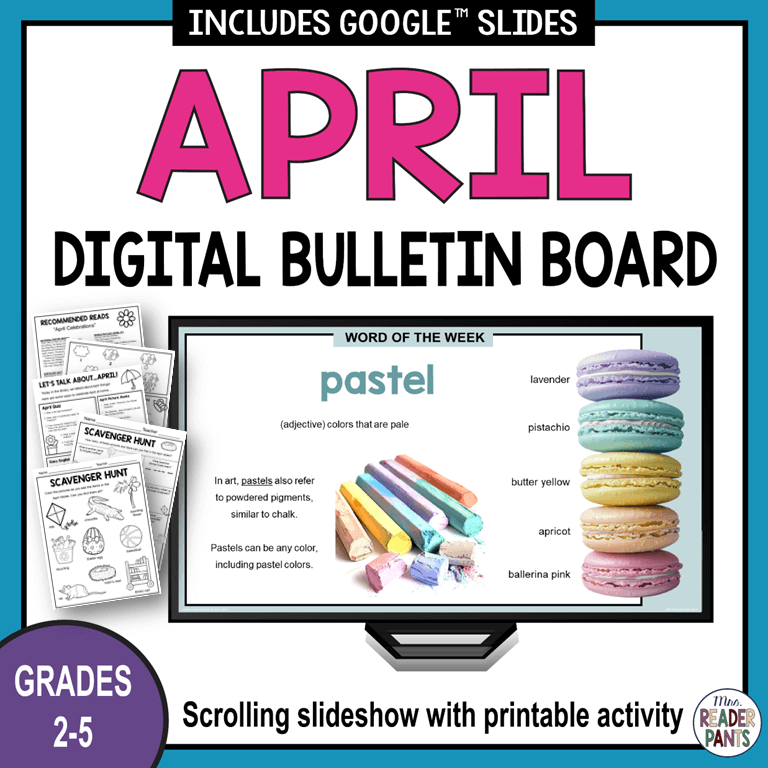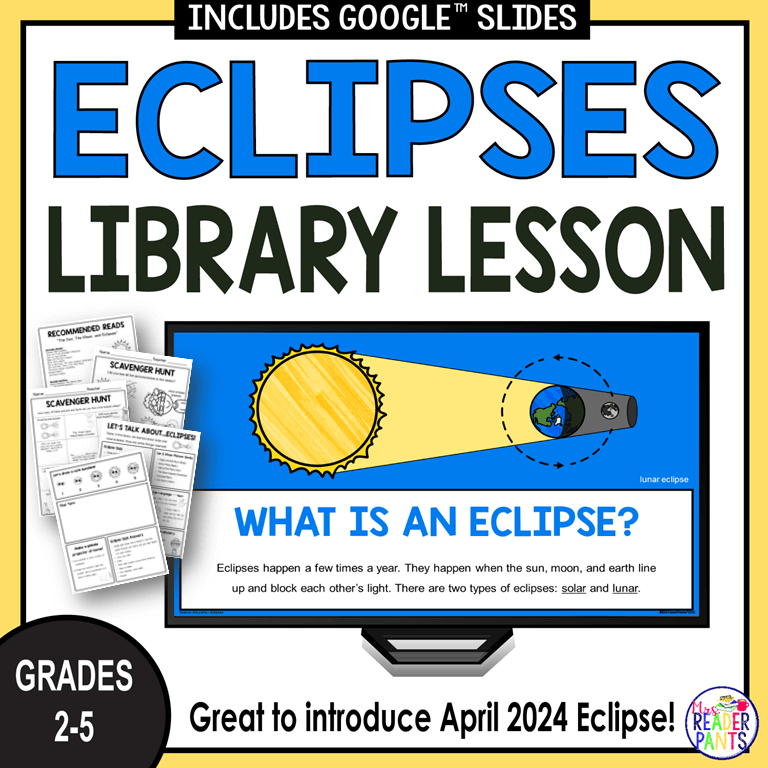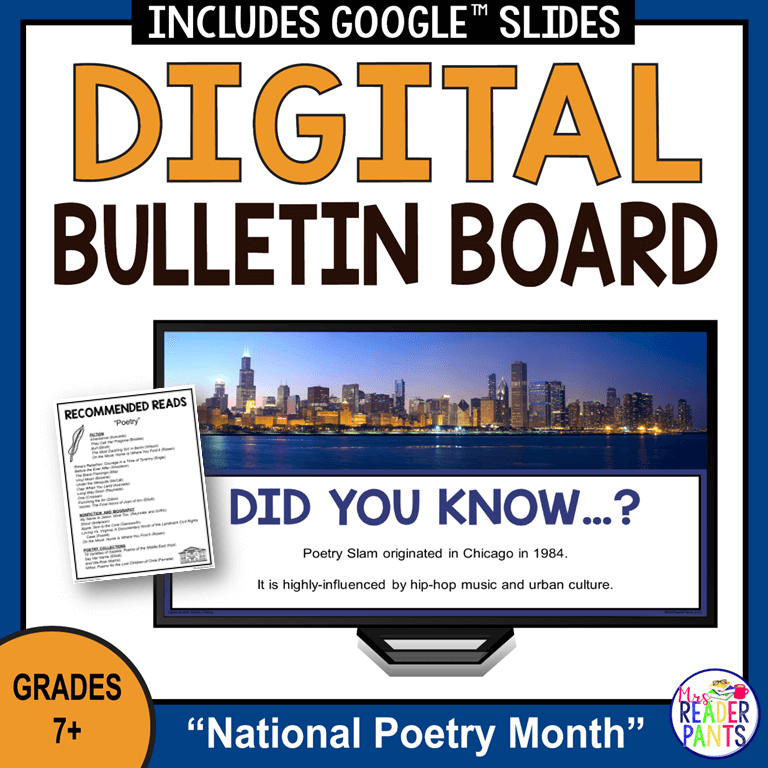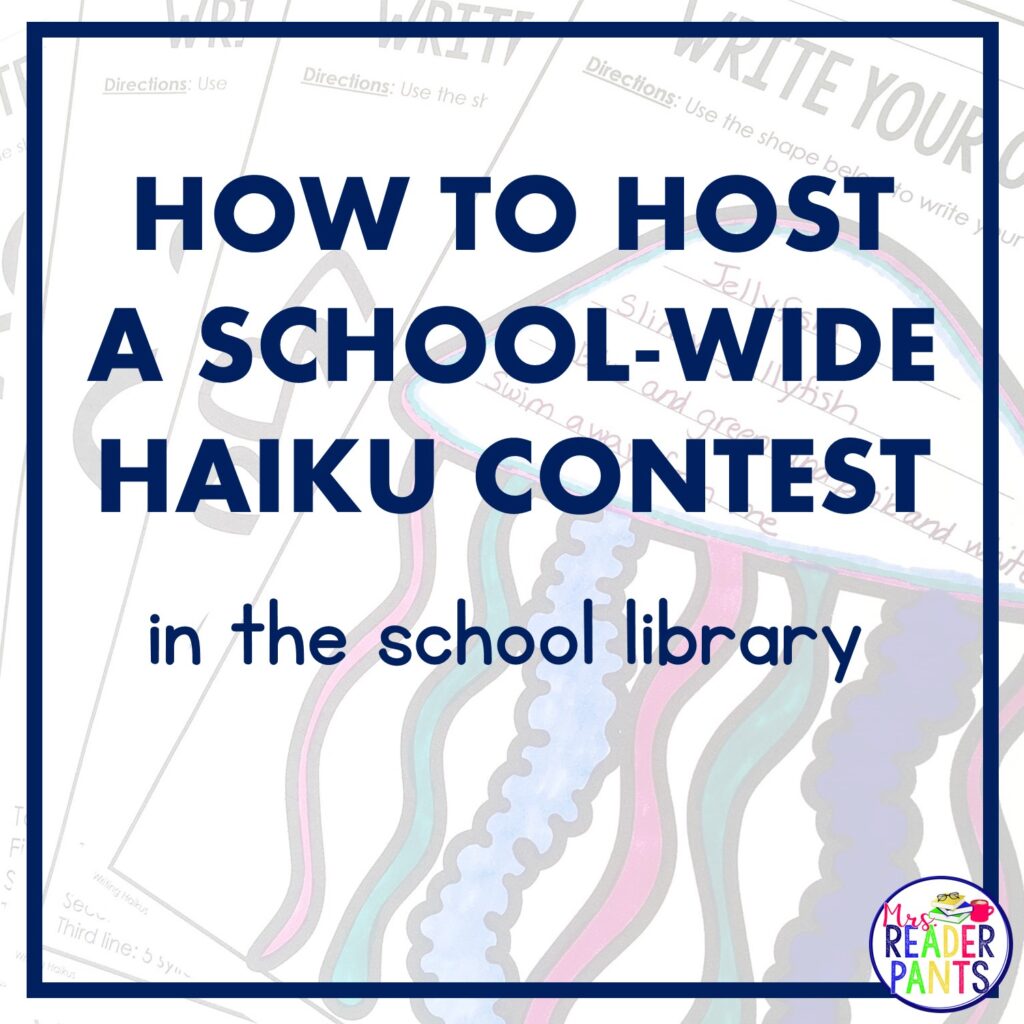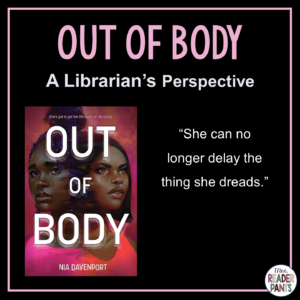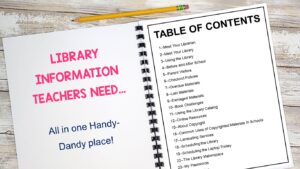
WHY DO YOU NEED A SCHOOL LIBRARY HANDBOOK?
With so much to communicate with teachers during back-to-school, a school library handbook is a MUST. From database logins to library policies to general information about copyright, there is just not enough time at the beginning of the school year to give all this information to teachers.
I created my first version of the school library handbook (which came to be called the “Handy-Dandy”) in my second year as a librarian. I didn’t intend for it to actually be called the Handy-Dandy, but that’s how my teachers referred to it. My first Handy-Dandy included all the pertinent library policies, database logins, library schedule, and other library information they need in one handy-dandy place.
I used our school’s comb-bind machine to put together about 35 Handy-Dandys. Each one had a clear cover for durability, which helped ensure teachers kept the Handy-Dandy in a safe place.
My teachers LOVED it! And who wouldn’t? It’s organized, easy to use, and saves teachers time.
Why do you need a school library handbook? Well…
REASON #1: THERE ARE ALWAYS NEW TEACHERS
This includes first-year teachers and teachers who are new to the building. The amount of information they get at the start of the school year is overwhelming. It makes things so much easier if teachers have all the library information they need in one easy location.
You may also have new teachers and student teachers who start mid-year, so it’s a good idea to keep a couple of extra copies on hand.
REASON #2: YOU ANTICIPATE YOUR TEACHERS’ NEEDS
I created my first library handbook in the summer before my second year as a librarian. In my first year, I had sent out emails about database logins. Teachers called me throughout the day (even when I was with classes) to ask for a login or a URL or copyright question or a million other things.
Creating a school library handbook anticipates your teachers’ needs. Even though I had a one-page reference to the database logins, it wasn’t enough. Teachers had questions about all kinds of things. When I created my first school library handbook, I thought about what questions teachers commonly asked me. These went into the handbook.
REASON #3: YOU’LL LOOK MORE POLISHED AND PROFESSIONAL
This is especially important for new librarians and librarians new to their schools. New librarians frequently hear about how the previous librarian did this or that. While the teacher may mean this as a “helpful suggestion” (and maybe it is truly helpful!), new-to-the-school librarians hear these comparisons a whole lot more than you’d think.
The more a new librarian hears how the previous librarian did things, the more we start to think the previous person did it was better than they way we think it should be done. Imposter syndrome in new librarians is real.
If that librarian was organized–as experienced librarians usually are–it can be especially difficult to follow in their footsteps. New librarians are “on display” every day, and it seems every person in the building has an opinion on how you compare. If you are a teacher reading this, please tread lightly with well-meaning advice about how the previous person did it.
If you are new, your teachers, students, admin, and parents WILL compare you to the previous person. I started 3 brand-new school libraries in my career, and even though I was the first-ever librarian at that school, I heard lots of comments and opinions about how I should do things or how another librarian did things.
New people, you are not alone in this! It’s frustrating and annoying, TBH. But if you have a polished, put-together library handbook, you show teachers that you are a professional. You are organized. You understand what their needs are. You are here to make their jobs easier. It’s a first step to showing them you really are going to be a great school librarian, even if you aren’t a carbon-copy of your predecessor.
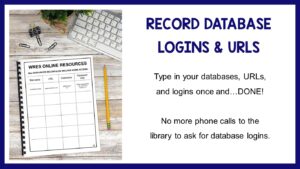
WHAT THE SCHOOL LIBRARY HANDBOOK IS NOT
Before we talk about what goes into your school library handbook, let’s talk about what it is NOT:
The school librarian handbook should not include official district policies that are unrelated to library. District and school board policies can often be found on your school district website, or in official publicly-available School Board documents.
Yes, some of the district policies can be useful to teachers, but they are not the purpose of a school library handbook. For one, board policies usually appear in legal language. They can change anytime. They are designed to protect the district or school in case a lawsuit arises. Teachers do not usually care about these unless there is a problem. You can quote small parts if appropriate (noted below), but for the most part, leave the district policies to the district website.
The school library handbook should not be set-in stone. It should be a fluid document that grows and changes from year to year. Policies, schedules, databases, logins, and philosophies will change over time. You will probably not need to revise it every school year, but you could if you needed to.
WHAT SHOULD I ADD TO MY SCHOOL LIBRARY HANDBOOK?
Below is a list of things I have included in my “Handy-Dandys.” This is just a guide. You can include a lot more or a lot less. The important thing is to get a school library handbook started. You can always revise it or add to it next year.
I also included suggestions of district documents you might want to add, such as your district statement on copyright, acceptable-use policy, academic honesty, and your district’s materials reconsideration (a.k.a. “book challenge”) policy.
Though these documents are usually (hopefully!) accessible on the school district website, teachers are super-busy and unlikely to dig for these important documents themselves. They are even less-likely to review them on a regular basis. Including them in the Handy-Dandy helps keep library-related district policies front-and-center for your teachers.
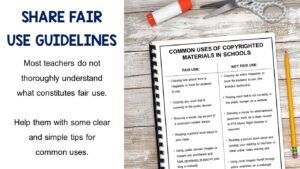
DOCUMENTS TO CONSIDER INCLUDING:
- Cover page–add a clear cover to increase durability
- Table of Contents–I don’t add page numbers. It’s just a list of what’s inside, in order of appearance.
- Librarian information–include your credentials, experience, and a few fun facts
- Facts about your library–number of volumes, number of databases, technology available, etc.
- Library use policies–procedures for non-library events held in the library (such as baby showers, meetings, etc), whether or not food and drink are allowed, keeping space clean, how to schedule events
- Checkout policies for students, teachers, and parents
- Lost library materials – procedures when library materials are believed to be lost
- Damaged library materials – procedures when library materials are damaged
- Polices for parent visitors–can they use library computers, can they come to the library during the school day
- Using the library catalog–include link to catalog; brief how-to on searching and checking out
- School’s online resources (include an area for URLs and login information)
- Copyright FAQs for teachers
- General procedures for teachers regarding book challenges–what should they do if someone approaches them about a library book
- Laminating services–when it’s done, who does it, how to get something laminated
- Scheduling the library–library timetable, how to schedule classes
- Scheduling library technology–how to schedule library tablets, laptops, computer lab, cameras, etc.
- Laptop reservations general guidelines–reminders that space should be left clean, how to report damage or repairs, etc.
- Library makerspace–what is a makerspace, how to schedule it, what’s available
- Board policies on acceptable use, academic honesty, district statement on copyright, library materials reconsideration policies
- Section for teachers to write in passwords
- Section for teacher notes
DON’T HAVE A SCHOOL LIBRARY HANDBOOK? USE MINE!
If you don’t yet have a school library handbook, it can be overwhelming to start one from scratch.
I’ve got one that is already made and 100% editable. I’ve included sample policies you can tweak for your school. These are policies that have worked in my schools in the past.
If you are new to your school, it’s a good idea to also go over your school library handbook with your principal before you give copies out to teachers. You need to know your principal will support you on policies that may cause a kerfuffle with some of your teachers (such as a “no staff parties, baby showers, or bridal showers in the library” policy–I could write a whole post on that one).
You can find my Handy-Dandy by clicking on the images below. They are also available on TPT. The elementary and secondary versions only vary slightly in the policies I included. If your library serves both elementary and secondary grade levels, just pick one of them. If you buy one and would like the other, just send me an email. I’m happy to send the other version to you for free.
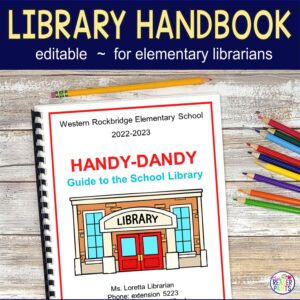

MAKE SURE YOU HAVE SOME KIND OF GUIDE FOR YOUR TEACHERS!
No matter what kind of library guide you use for your teachers, please make sure you are using something. They will need database logins, and no matter how often you send logins via email, many teachers will appreciate having all the logins at their fingertips.
The Handy-Dandy (or other guide) will put all information teachers need to know about the library in one easy place. As a former teacher myself, I would have loved to have had something like this when I was in the classroom! Anything you can do to make your teachers’ lives easier will be a huge score as a librarian!

